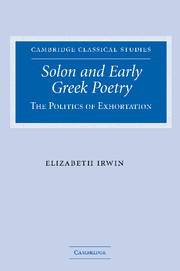Book contents
- Frontmatter
- Contents
- Acknowledgements
- List of abbreviations and editions
- Introduction
- PART I THE POLITICS OF EXHORTATION
- PART II POLITICAL POETICS: SOLON'S EUNOMIA
- Introduction
- 4 Solon 4 and martial poetry
- 5 Solon's Odyssey
- 6 Solon 4 and Hesiod
- PART III POETRY AND POLITICAL CULTURE
- Conclusion
- Appendix I Who were Tyrtaeus' gymnetes?
- Appendix II λυκάβαντος: when the wolf comes?
- Bibliography
- General index
- Index locorum
6 - Solon 4 and Hesiod
Published online by Cambridge University Press: 05 November 2009
- Frontmatter
- Contents
- Acknowledgements
- List of abbreviations and editions
- Introduction
- PART I THE POLITICS OF EXHORTATION
- PART II POLITICAL POETICS: SOLON'S EUNOMIA
- Introduction
- 4 Solon 4 and martial poetry
- 5 Solon's Odyssey
- 6 Solon 4 and Hesiod
- PART III POETRY AND POLITICAL CULTURE
- Conclusion
- Appendix I Who were Tyrtaeus' gymnetes?
- Appendix II λυκάβαντος: when the wolf comes?
- Bibliography
- General index
- Index locorum
Summary
Examination of the affinities of Solon 4 with the Hesiodic tradition completes the project of analysing how Solon effectively situates himself within poetic traditions. Above all, the sheer pervasiveness of Hesiodic material in this poem demands consideration of the implications of such a marked relationship, particularly when this positive relationship is contrasted with Solon's treatment of martial epic and elegy. But before the Hesiodic element of this poem and its role within the overall strategy of the poem can be analysed, certain potential difficulties need to be confronted at the start. These difficulties are all related to the theme of reception.
Thoroughly hesiodic?
What does it mean to say Solon 4 is or is not thoroughly Hesiodic? Prevailing scholarly debate has defined this question in a particular way, focusing almost entirely on whether Solon had the same conception of δίκη as Hesiod. While this is an important concern, a host of equally important but underexplored questions lie behind assessing whether Solon was or was not thoroughly Hesiodic. One may ask first of all what status Hesiod had in the first two quarters of the sixth century and what it might have meant at that time to be ‘Hesiodic’. At the same time, one may ask how we are to talk about allusion in a culture of (predominantly) oral poetry and to imagine the reception of such allusion.
- Type
- Chapter
- Information
- Solon and Early Greek PoetryThe Politics of Exhortation, pp. 155 - 198Publisher: Cambridge University PressPrint publication year: 2005



